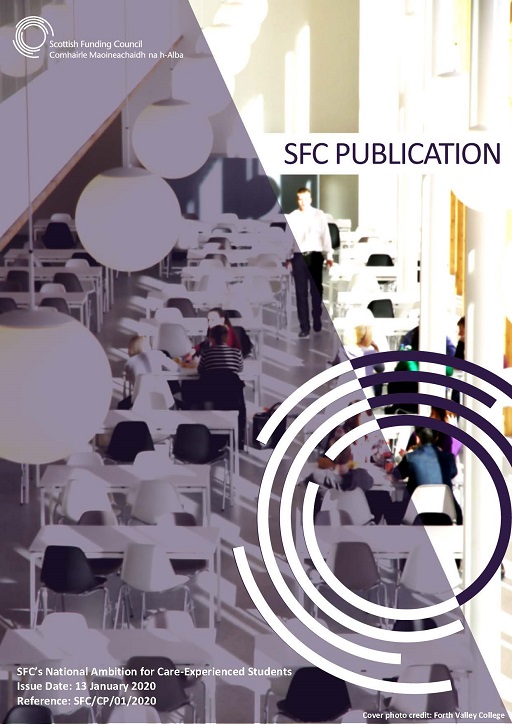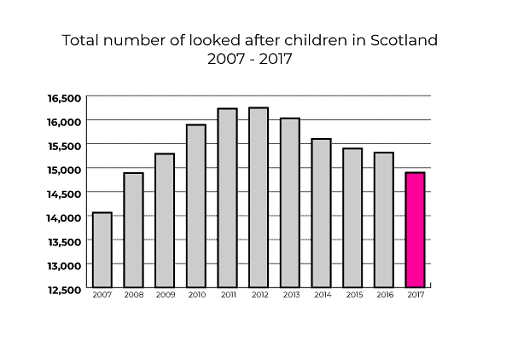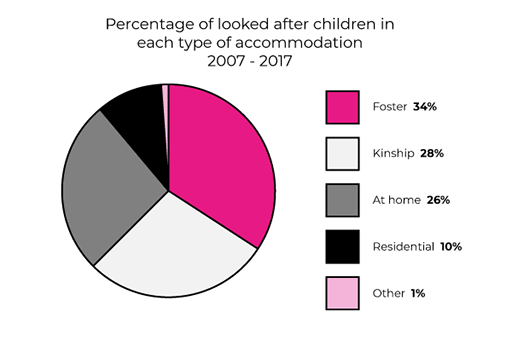Use 'Print preview' to check the number of pages and printer settings.
Print functionality varies between browsers.
Printable page generated Friday, 19 April 2024, 3:06 AM
2 What is Corporate Parenting?
Corporate Parenting and care experience
Corporate Parenting originated as a concept in the mid-1990s and has been part of Scottish Government policy since the 2008 report These Are Our Bairns. The report described the challenge for everyone involved in Corporate Parenting as:
“How do you give a child in your care the love, security and chances that any good parent would give their child?”
Every college and university in Scotland is a named Corporate Parent under the Children and Young People (Scotland) Act 2014.
This means that they must work to uphold the rights and safeguard the wellbeing of ‘looked after’ children and young people, and care leavers aged under 26 across Scotland.
In this course we’ll generally refer to this group as Care-Experienced people, as this is an inclusive term which they themselves prefer. It covers children and people of all ages, with all varieties of care experience and recognises its lifelong impact. Importantly, it shifts the emphasis, with care seen as something they have come through and learned from rather than simply something that was done to them.
As a staff member within a university, you are a Corporate Parent and have an opportunity to make a huge difference to the lives of Care-Experienced people.
Throughout this course, university refers to one of Scotland’s 19 Higher Education Institutions (HEI).
A Scottish Government priority
The Scottish Government has a vision of making Scotland the best place in the world to grow up. This means that children grow up loved, safe and respected, so that they realise their full potential, and are well educated, skilled and able to contribute to society.
The Government believes that all of Scotland’s young people should have equal opportunities to access and succeed in further and higher education irrespective of their background.
Care-Experienced people are among the most vulnerable and disadvantaged in our society. This course will give you some insight into the disadvantages your students may experience and how you can support them to achieve better outcomes.
The National Ambition for Care-Experienced students
The Scottish Funding Council (SFC) invests over £1.8 billion each year in Scotland’s colleges and higher education institutions (HEIs). Its vision is that by 2030 there should be equal outcomes of Care-Experienced students and students without care experience.
In delivering this National Ambition, the SFC aims to:
- ensure the number of care-experienced students are fairly represented at college and university. For HEIs we have an ambition that 1.4% of Scottish domiciled undergraduates are care-experienced
- increase the proportion of care-experienced articulating students from college to degree level courses at university with Advanced Standing
- work towards equality of outcomes with regards to retention and outcomes
- monitor, evaluate and report on intake, progression, retention and success of Care-Experienced students at college and university
- create opportunities for Corporate Parents to connect and network so that they can learn from each other.
The SFC needs your help and support to achieve our National Ambition for care-experienced students at college and university.
Who are Care-Experienced people?
Care-Experienced people are those who are or have been looked after by their local authority, having been deprived of parental care for any reason, or due to concerns about their wellbeing.
“We use the term care-experienced to include anyone who has been or is currently in care or from a looked after background at any stage of their life, no matter how short. This care may have been provided in one of many different settings such as in residential care, foster care, kinship care or looked after at home with a supervision requirement.”
The care population
There are currently 14,897 young people in care in Scotland.
This represents 1.4% of the 1.2 million young people aged under 18. This is similar to the entire population of Troon, Broxburn or Port Glasgow.
The care population figures give a snapshot of children and young people who are currently looked after. The Care-Experienced population is much larger as it includes everyone who has been looked after at some point in their lives but we do not have accurate data for this group.
Different types of care experience
- At home: living with parent(s) but with involvement from services
- Kinship: living with friends or relatives
- Foster: living with another family
- Residential: living in a children’s unit/house
- Other: a different community with prospective adopters.
Most looked after children fall into two categories:
- Looked after at home – where the child or young person has been through the Children's Hearings system and is subject to a Supervision Requirement (regular contact with social services) with no condition of residence.
- Looked after away from home – where the child or young person has either:
- Been through the Children’s Hearings system and is subject to a Supervision Requirement with a condition of residence
- Is subject to an order made or authorisation or warrant granted by virtue of chapter 2, 3 or 4 of Part 2 of the 1995 Act
- Is being provided with accommodation under Section 25 (a voluntary agreement)
- Is placed by a local authority which has made a permanence order under section 80 of the Adoption and Children Act 2007.
Supervision Order
Where a child is considered to be ‘at risk’, and it is not possible for public services to address that risk in cooperation with the child and/or their parents/carers, a Children’s Hearing can make a Compulsory Supervision Order (or an Interim Compulsory Supervision Order).There is a list of reasons (in law referred to as ‘grounds’) why a child may be considered ‘at risk’, and therefore referred to a Children’s Hearing.
The Children’s Hearings System is Scotland’s unique care and justice system for vulnerable children and young people. It operates a decision-making lay tribunal made up of members of the Children’s Panel. Their website provides information about the System and the different types of orders and agreements that looked after children may be subject to.
Reflection
Activity 1
As you go through the course, there will be opportunities to reflect or make notes on what you are learning. You can do this in your learning journal (if you have one) or make notes in the text boxes provided. This text will be saved for you to look back on later.
You can start here by making notes on your initial impressions of the course.
- Do you use the term ‘Care-Experienced’ or are you used to a different one, such as ‘care leavers’?
- How familiar were you with the concept of Corporate Parenting?
- How relevant does this feel to your role?
In the next section we will look at the impact of care experience. As you work through it and listen to the stories of Care-Experienced people, try to reflect on what you would do if they were your child.
Now continue to Session 3 Impacts of care experience.



